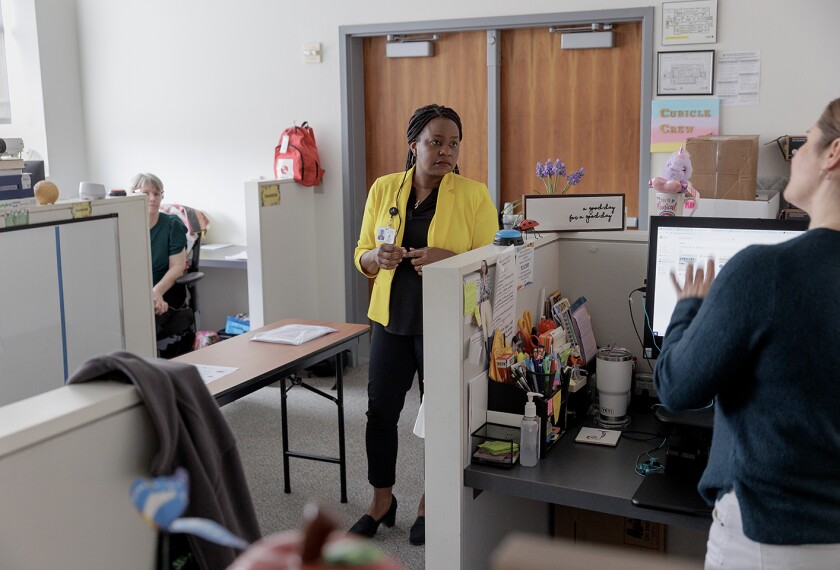Peak flu season hasn’t struck yet. But the Centers for Disease Control and Prevention yesterday revealed signs pointing to a higher-than-normal incidence of a range of infectious illnesses, including influenza, this year.
Here’s one reason why. CDC numbers released this week show national rates of certain required vaccinations (diphtheria, tetanus, and acellular pertussis (DTaP) and polio vaccines) for kindergartners hovering around 93 percent. These numbers, relatively flat over the past few years, have not rebounded to the pre-COVID level of 95 percent in 2019-20.
While 93 percent might sound high, some medical professionals are calling that rate “worrisome.”
“It’s going to impact attendance in schools and set up schools for preventable outbreaks that could impact not just students, but whole communities,” said Lynn Nelson, president-elect of the National Association of School Nurses.
Here’s a look at what’s behind these trends, some immediate and potential implications, and tactics Nelson says can be effective at changing attitudes.
Attitudes, access affect vaccination rates
Nelson attributes the stubbornly flat vaccine rates to both vaccine hesitancy among parents and guardians, and challenges for families in accessing vaccinations.
“We’re dealing with a subset of parents who have really come to believe that vaccines in general are detrimental to their children,” Nelson said.
She blames a general mistrust of the medical field and readily available misinformation, spread on social media sites and by word of mouth, for fueling this belief. “It used to be that families with young children would trust their health-care providers,” she said. “Now, some people are generally distrustful of the medical field.”
The repercussions of this distrust extend beyond the skeptics themselves. For instance, the presence of protesters at school vaccine clinics—usually families and other community members who are against vaccine mandates—can dissuade other nearby districts from hosting clinics of their own.
“In some communities that are vaccine hesitant, districts will not even put on clinics,” Nelson said.
Negative attitudes about vaccines can also sway public officials’ decisions around vaccine mandates. For instance, The city council in the District of Columbia voted this week to repeal a COVID-19 vaccine mandate for eligible public school students that was passed in 2021.
Testifying before the council, Thomas Farley, senior deputy director of community health administration with the district’s health department, said that “parents’ resistance [to the vaccine] would make it very difficult to enforce a mandate for COVID-19,” according to a local news report.
Vaccine exemptions increasing
In addition to less than ideal vaccination rates, health officials report an increase across states in vaccine exemptions, which allow parents to opt out of having their children vaccinated. Up to 3 percent of children entering kindergarten in 2022-2023 received a vaccine exemption for medical, religious, and/or philosophical reasons. (Currently, 50 states allow medical exemptions, 44 offer religious exemptions, and 15 states permit philosophical/personal belief exemptions.)
Overall, the share of vaccine exemptions rose in 40 states and the District of Columbia. In 10 states, such exemptions exceeded 5 percent—the point where achievable vaccination coverage against a preventable disease is no longer applicable, according to health officials.
Also this week a high school in Carlisle, Pa.—among the 15 states that allow exemptions for medical, religious, and philosophical reasons—confirmed 10 cases of pertussis, or whooping cough, among its students. Two weeks ago, the Pennsylvania department of public health confirmed a similar outbreak in Cumberland County, Pa. Two standard childhood vaccinations protect against pertussis: DTaP and Tdap. Before the vaccine’s development, pertussis was a major cause of infant morbidity and mortality. But incidents of the illness dropped from between 150,000 and 250,000 cases per year to a low of 1,010 cases in 1976. It’s back on the rise, in part because of waning adolescent and adult immunity, according to data from the National Institutes of Health.
Local outreach can be effective, especially when involving trusted figures
Amid these challenges to vaccinations, Nelson acknowledged that school nurses, as trusted members of the community, can have a positive influence on families’ decision-making.
“I do think those personal efforts to reach out to families, such as phone calls from a school nurse, can influence them much more effectively than broader campaigns,” she said.
Some school communities struggling with a lack of access to health-care providers, especially in rural locales, have had success bringing vaccine clinics to schools. Generally, the school nurse will partner with a local health-care provider who’s willing to travel and set up a clinic at school, usually on weekends or after school. Typically, state departments of public health will contract with private pharmacies and provide vaccines to students free of charge, Nelson explained.
“We’ve had really good results doing this,” she said, referring to Washington State, where there is a large number of rural and remote school districts.
There’s one other thing that can change behavior, although it’s not one health professionals ever want to see: When an outbreak of a preventable infectious disease affects a community where vaccine hesitancy runs high.
Nelson said she’s old enough to remember outbreaks of pertussis, whose spread has the most deleterious effects on infants, the elderly, and people who are immunocompromised.
“These outbreaks generally serve as a catalyst for people to get vaccinated,” she said. “Sometimes, that’s what it takes to get people to think differently about vaccinations.”






